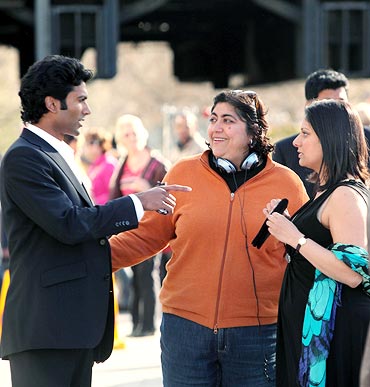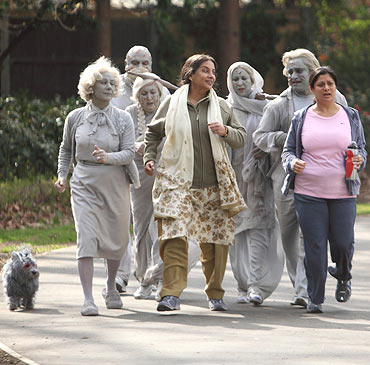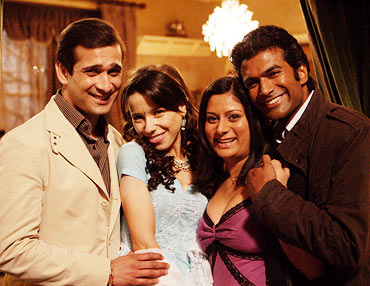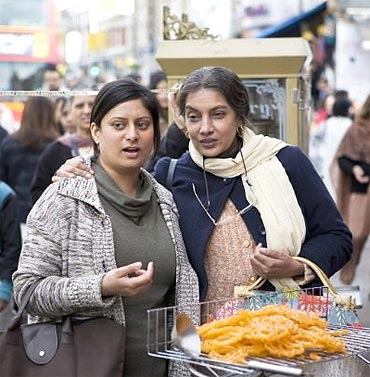 | « Back to article | Print this article |
'I love shooting the big Punjabi wedding scenes'
But she is best known for her surprise hit Bend it Like Beckham (2002) -- a rare British Indie film about a Sikh girl's desire to play soccer.
A boisterous comedy with big wedding sequences, Beckham touched a lot of hearts, crossed over to mainstream theatres and became a worldwide hit. After Beckham, Chadha directed Bride and Prejudice (2004) for Miramax Films.
Inspired by Jane Austen's novel, B&P was said to be a vehicle to launch Aishwarya Rai's international career. Suddenly Chadha was in demand. She was offered a couple of Hollywood projects, with high profile star names attached -- Dallas, Dream of Jeannie.
Unfortunately those projects never materialised. Then in 2008 she directed a charming little British comedy Angus, Thongs and Perfect Snogging. That film did not get a theatrical release in the US nor in India.
Chadha's fans will be thrilled to learn that she is back with a bang. For her new film It's a Wonderful Afterlife (co-written with her Japanese-American husband Paul Mayeda Berges), Chadha returns to the Asian neighbourhood in London where she grew up.
The film opens April 23 in the UK and May 7 in India. Chadha spoke to Aseem Chhabra about Afterlife in a telephone interview from London.
The interview was peppered with Chadha breaking into loud boisterous laughter and references to her Punjabi (or Punjubee as she pronounces the word) upbringing in London.
'I am absolutely useless at horror'
You know how much I love shooting the big Punjabi wedding scenes. But I was concerned that if I ever did shoot another one, I would be repeating myself.
Then I had the idea of a scene I would really like to see in the cinema -- a big Punjabi wedding but it turns into the prom scene from Carrie, because everything goes wrong and crazy. There are food fights and whole thing is turned on its head.
It is also something we as an audience and as a community have never seen before and I had never done horror. Wouldn't it be fun to make a film back in my community, but this time as a horror film? So we embarked on making a comedy-horror film.
Along the way we realised that I am absolutely useless at horror (laughs), partly because I never watch them. Carrie was the first. I did see Silence of the Lambs, but I was hiding behind the sofa most of the time, I had all the lights on and even then I was screaming. I can't see horror films by myself.
In a way, this is a homage to a few or select horror kind of movies. But it is really more of a supernatural comedy. There isn't even a thriller aspect to it.
The set-up is pretty funny. A Punjabi mother has a daughter who is a little fat, a little big and not exactly beautiful. She has a broken engagement behind her and she kind of has let herself go. People in the community are very mean about this girl and finally the mother has had it enough and so she decides to kill anyone who calls her daughter fat (laughs loudly).
It's more of a treatise -- a discussion about life after death. And then really we are examining your life after you have died, whether you led a good life or not. Some of the people she kills in the community are quite upstanding, but we learn that they all have dirty laundry.
They are all people who were mean to the girl, but they realise the errors of their ways and try to put it right, while they are decomposing. It has An American Werewolf in London side about it too.
You cast Shabana Azmi to play a Punjabi mother. She has played a Sikh woman in Ben Rekhi's Waterborne, but this is still a big departure for her. How did that come about?
This is the first time I have directed a film where I felt I could offer it to the actress who has played everything. And she's such a superb actress. I called Shabana and said 'I have a script I want to send you' and she said 'I'll do it' without reading the script. She also said, 'I so want to work with you, it will be so much fun, I will do it.' When I sent her script she absolutely loved it.
It was a challenge for her, because as you know she is kind of a posh Bombay lady. Here she is playing a very typical Punjabi British woman, middle aged, slightly working and middle class, but certainly not polished. And you will see she completely became the part.
We were shooting in Southhall and people didn't even recognise her. Finally one woman walked up to her and asked, 'Are you Shabana Azmi?' And she said, 'Why yes,' very pleased, that someone recognised her. The woman responded 'Oh my God, you used to be so beautiful. What happened to you?' She had put on loads of weight and she looked fat and dumpy. She has a huge stomach in the film and she wearing discount clothes off the racks.
'This film is definitely from the same stable as Bend it Like Beckham'
Yes, she came to a few parties with me and met my relatives. She would sit there and watch the people. She watched my Mum quite a lot. She watched how Punjabi women sit when they are wearing salwar kameez. They kind of sit with their stomachs hanging forward and their legs apart (bursts out laughing loudly). So you see all the ghere(pleats) of the salwar hanging down.
She would constantly sit with her legs apart. It is the most undignified way of sitting, but when you are an older Punjabi woman it is the most comfortable way. She actually became the person, as opposed to the very sophisticated erudite Shabana.
And you cast the handsome Sendhil Ramamurthy as a love interest for your overweight heroine Roopi (Goldy Notay)...
I wanted someone who looked like he hadn't lived in Southhall or London for a long time. In the film he hasn't seen Roopi for many, many years. I wanted him to give the sense that he was an out-of-towner. Also Sendhil is very good looking and he has a lot of fans in the community.
I cast him as a career police officer, but also someone with matinee idol good looks in contrast to Sanjeev Bhaskar's (the host of The Kumars at No 42) character.
Bend It Like Beckham was 2002 and it has been eight years since then. You have come a full circle.
This film is definitely from the same stable as Bend It Like Beckham. Since Beckham I have made two films and those have been different -- I made the musical which was quite Indian and I made Angus, Thongs and Perfect Snogging which is very English coming of age. I know people were very keen for me to make another film like Beckham.
This really was my attempt to go inside that world without repeating in making the same kind of movie. So it's that world, but a different genre.
The UK and India release dates are coming up soon but what about the US?
In the US we are talking to a distributor right now. It is such a bad time in the US for independent movies.
Recently I had lunch with Ashok Amritraj and that was kind of depressing. He's got all this money, but it is just a terrible time. He was telling me that there is project that's come to him -- directed by Darren Aronofsky (The Wrestler) with Angelina Jolie and they can't set it up.
All the studios have passed on it. Right now they just want to do franchises and sequels. There's a whole tier of movies that aren't getting made.
I am kind of in favour of releasing it like My Big Fat Greek Wedding, where we platform it and then let it grow. We had a great screening at Sundance (the film festival in the US launched by Robert Redford) with 1,800 people in the audience. They generally were Salt Lake City types and they absolutely loved it, especially the women.
It's definitely a very audience friendly film.
So you think it will transition well to the mainstream in the US, even though all the characters are Indians?
Oh yes. It's a very British film as well. It feels like the Ealing comedies, even though the characters are Indian. It's also very universal. When I first watched it, it felt like the early Pedro Almodovar movies, that kind of caper movie with crazy characters.
It's a little bit like What Have I Done to Deserve This? or Women on the Verge of a Nervous Breakdown. But the overall theme is about the heroine who is Indian and she's fat. So that's a first (laughs).
One thing that is interesting for me is that this is the first film I've made where I haven't really thought about anyone else. I said this is very funny for us, for me and other people like me. The humour and the storyline -- it just defies definition if you are film buff. But if you are Indian and particularly in the Diaspora then it really fits very comfortably for you and the humour is very much like that.
These are images in the film I have never seen of us. I have never seen zombie looking women who look like my Mum. It's that kind of subversive humour.
'It's more of a supernatural comedy'
Paramount decided not to release it theatrically because they thought the audience would mainly be young women and that they would have to spend millions on marketing the theatrical release and to eventually sell DVDs.
But instead if they put it on the network on Nickelodeon, they would still get the DVDs. They ended up showing it as a New Year's Day movie on Nickelodeon. So I got pissed at that time because we actually had a very successful test screening at the Sherman Oaks Galleria Mall (in California).
Were they afraid that the British accent would not work for the theatre audience?
No. Basically when we started the film, there was one studio head. By the time we finished the film, we had been through four studio heads. So we didn't have a person in power who could claim the film as his or her baby. We were a bit of an orphan. And then it came down to economics.
However, now things are a bit different. Nickelodeon has approached me to do the TV spinoff, based on my movie. So I am not pissed off anymore.
'My children are in quite a lot of scenes'
We are working on two projects. One is a beautiful children's film set in Kerala around elephants. It will be a very classic, innocent children's adventure film. We are also working on a very important film about India's independence film, but from the perspective of a British Asian woman.
And you spend most of your time in the UK or sometimes in California?
We are mostly here in London. There is a commitment of the children (she and Paul have three-year-old twins -- a boy and a girl). It is hard enough for us to get through the day and manage a few hours of writing. This is such a wonderful time from the age of three onwards.
So we decided we want to spend as much time with the kids before they go to school. One of the reasons I did this movie was because it was so manageable. It was a seven week shoot and I could organise the schedule, so that I was with the kids either in the morning or evening. I was able to make the schedule work for me as a mother as well as a director.
Do they make an appearance in the film?
They do, they are in quite a lot of scenes (laughs loudly).




